Silverbee represented the 2015 Poetry Out Loud competition. Watch this story of 17 year-old Daiana James, the champion from Washington DC, on AP Television.
https://www.youtube.com/watch?v=iQG-zguUTUo&sns=em
Silverbee represented the 2015 Poetry Out Loud competition. Watch this story of 17 year-old Daiana James, the champion from Washington DC, on AP Television.
https://www.youtube.com/watch?v=iQG-zguUTUo&sns=em
Earlier this year, Silverbee started supporting a beekeeper organization in the area to help save the honeybee and we were happy to see that a recent White House initiative is working towards the same goal. We are proud we could help get the word out about Sustainable Honeybees in Loudoun County. Read the blog post below and this Washington Post story to learn more about their great work!
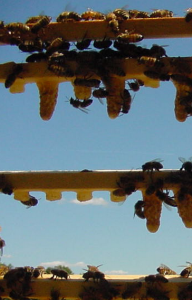 Have you ever thought about the bee cause? Probably not, right? When you think about environmental issues and endangered species, the animal that comes to your mind might be a tiger subspecies or the blue whale or maybe another one you frequently hear of, but let’s be honest: we don’t think of the bee. Well, we definitely should, and here’s why: bees are responsible for a third of the food we eat. Declining bee populations pose a serious threat to global agriculture.
Have you ever thought about the bee cause? Probably not, right? When you think about environmental issues and endangered species, the animal that comes to your mind might be a tiger subspecies or the blue whale or maybe another one you frequently hear of, but let’s be honest: we don’t think of the bee. Well, we definitely should, and here’s why: bees are responsible for a third of the food we eat. Declining bee populations pose a serious threat to global agriculture.
While you may not see bees on the official list of endangered species, there has been a massive drop of bee numbers not only in the U.S. but all over the world. National Geographic states that more than half of managed U.S. honeybee colonies have disappeared in the past decade. Therefore, scientists have recently tried to raise more awareness for the pollinator cause. In 2013, the Xerces Society petitioned the Interior Department to consider listing the bumblebee as endangered. Until today, none of the thousands of species of native American bees enjoy Federal protection. According to the Natural Resource Defense Council, the US could lose $15 billion worth of crops, which would have a huge impact on the availability of many beloved fruits and veggies, such as apples, pumpkins and almonds.
The list is long and beekeepers, research entomologists from the USDA, regulators and expert institution scientists from California to Europe are very concerned. Recent studies have found reasons for the disappearance of bees. Pesticides, diseases, changes in the habitat are among them. The need to reverse the decimation of bee populations has never been greater.
As you can guess, and you may have read in our previous post about the name Silverbee, we like bees. They learn, build, communicate, and keep nature alive. We also care about and embrace causes that impact the future. We support the bee cause in the area because it’s vital now and tomorrow.
So we found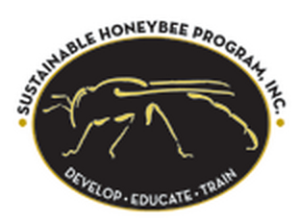 the Sustainable Honeybee Program in Virginia, a nonprofit organization located at
the Sustainable Honeybee Program in Virginia, a nonprofit organization located at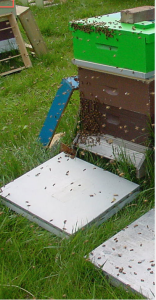 the foot of the Blue Ridge Mountains in Loudoun County, Virginia. Led by certified EAS Master Beekeeper Billy Davis, the program develops a line of honeybees particularly adjusted to the climatic conditions of the area. Billy teaches at the Northern Virginia Teaching Consortium, and shares his knowledge and expertise with beekeeper clubs and individuals through the organization that is all-volunteer based. We hope that with our donations we can help the organization keep up the great work that they are doing and thus, not only enjoy the delicious Virginia honey but also maintain a sustainable flora and fauna in our surrounding. Let’s keep that oh so sweet buzz alive!
the foot of the Blue Ridge Mountains in Loudoun County, Virginia. Led by certified EAS Master Beekeeper Billy Davis, the program develops a line of honeybees particularly adjusted to the climatic conditions of the area. Billy teaches at the Northern Virginia Teaching Consortium, and shares his knowledge and expertise with beekeeper clubs and individuals through the organization that is all-volunteer based. We hope that with our donations we can help the organization keep up the great work that they are doing and thus, not only enjoy the delicious Virginia honey but also maintain a sustainable flora and fauna in our surrounding. Let’s keep that oh so sweet buzz alive!
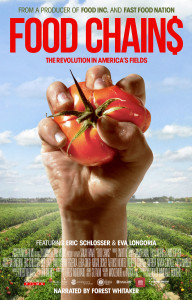 Food Chains, a project we’ve been working with for the last year, just won the James Beard Award! The annual awards by the James Beard Foundation honor the outstanding work of chefs, restaurants, cookbook writers, journalists and other food professionals for excellence in cuisine, culinary writing and culinary education in the United States. Food Chains, the story of the farmworkers who pick our fresh produce and their quest to convince retailers and consumers to join the Fair Food Program, stars Eva Longoria and Eric Schlosser, who are also executive producers, and is narrated by Academy Award-winning actor Forest Whitaker.Directed by Sanjay Rawal, Food Chains highlights myriad problems still present in our agricultural system today and how big conglomerates at the top reap huge profits the expense of those at the other end – the farmworkers. At the same time, however, it focuses on the work of an intrepid group of tomato pickers from southern Florida, the Coalition of Immokalee Workers (CIW), who, together with Florida’s tomato farms have radically transformed agriculture there through the Fair Food Program, a revolutionary partnership between the CIW, Florida tomato farmers and a few large retailers. Their aim is to ensure a dignified life for farm workers and a more humane, transparent food industry.
Food Chains, a project we’ve been working with for the last year, just won the James Beard Award! The annual awards by the James Beard Foundation honor the outstanding work of chefs, restaurants, cookbook writers, journalists and other food professionals for excellence in cuisine, culinary writing and culinary education in the United States. Food Chains, the story of the farmworkers who pick our fresh produce and their quest to convince retailers and consumers to join the Fair Food Program, stars Eva Longoria and Eric Schlosser, who are also executive producers, and is narrated by Academy Award-winning actor Forest Whitaker.Directed by Sanjay Rawal, Food Chains highlights myriad problems still present in our agricultural system today and how big conglomerates at the top reap huge profits the expense of those at the other end – the farmworkers. At the same time, however, it focuses on the work of an intrepid group of tomato pickers from southern Florida, the Coalition of Immokalee Workers (CIW), who, together with Florida’s tomato farms have radically transformed agriculture there through the Fair Food Program, a revolutionary partnership between the CIW, Florida tomato farmers and a few large retailers. Their aim is to ensure a dignified life for farm workers and a more humane, transparent food industry.
http://www.jamesbeard.org/blog/2015-book-broadcast-and-journalism-awards-complete-winner-recap
We recently helped get the word out about Art for Humanity, in the Washington Post. Art for Humanity has been working in Honduras for a decade to help the poor to help themselves. Led by our friends and neighbors Glen and Karen Evans, they collect donations such as shoes, furniture, paint, toys, and household items and sort and ship those resources to families in Honduras living in poverty. Art for Humanity also help families to establish small businesses to cover educational and health expenses. One of their most remarkable achievements is the Leadership Center (a women’s college) which is run by volunteers from Honduras and the United States.
Glen Evans spends half of the year in Honduras to make sure the donations he and his team ship make it to the people who need it most. Glen was there in March and wrote about his experience. “Most people can’t imagine the level of poverty in Honduras. For example, yesterday I was in a home that had no furniture. Not a chair. Not a table. Not a shelf. Not a plastic storage container. Nothing. And, last night I ate with a family who had no chairs. They went outside and brought in a tree stump for me to sit on. They sat on the floor.”
My kids volunteer a few times a year at Art for Humanity sorting shoes before they are shipped to Honduras. Glen brings back photos showing how the kitchen cabinets, rugs, and windows we donated were used to improve people’s homes. Follow his blog to find out what is new and send your shoes!
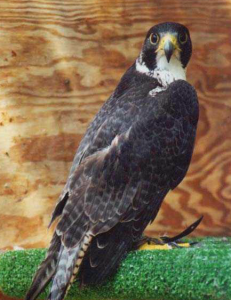
I just met the Sopranos.
My husband and I spent a weekend in the Adirondacks for some R&R. Over Friday night dinner at the lodge we were seated with Jean and Len, the Sopranos. We regularly meet people with fascinating lives and careers here, but the Sopranos are an exceptional couple, and I have to buzz about them.
Both Len and Jean are retired – she taught fifth grade for decades — but as longtime lovers of wildlife, they now devote their time and acreage in Pennellville, New York to caring for wild animals with special needs. They only get one weekend away from home every year, and they spend it in the Adirondacks. The rest of the year they care for and rehabilitate wild birds – eagles, ospreys, owls -and black bears who have been hurt or lost. Their nonprofit, Kindred Kingdoms, currently cares for 34 birds and three black bears who will be spending the winter hibernating with them, and Jean said they were expecting to pick up an osprey within a week. They have a team of volunteers, including veterinarians who provide medical care, and are funded by donations.
The Sopranos have been running Kindred Kingdoms since 1997 and they know a lot about the wildlife of the American northeast. Interesting fact: hibernating bears recycle their urine to preserve nitrogen levels in their bodies during the winters.
Jean said many wild birds, including those recovering at Kindred Kingdoms, suffer from the effects lead poisoning. This is a growing problem in New York State, where lead bullets are illegal but still abundant and in rampant use by hunters. Birds of prey eat carrion contaminated with lead bullets. The birds also eat fish that have absorbed lead from waterways that are contaminated by old lead sinks. The lead makes birds sick or unable to care for their young. Increasingly, the birds do not survive.
Len said lead poisoning is thought to be the cause of erratic, unexplained behavior among some loons. Loons are usually attentive and careful as parents, but lately some loon parents have abandoned their offspring with no explanation.
Len and Jean and Kindred Kingdoms are providing a safe place for wildlife to recover from injury so they can be released into the wild when they are ready. They are also teaching other people and kids in their area about wild animals and how people impact their environment – and what we can do to protect them.
Kindred Kingdoms is really making a difference. 100% of their donations go to medical care, supplies, habitats, and of course, food, food, food. Check out their newsletter and make a donation this winter to help shelter these animals through the cold winter months.
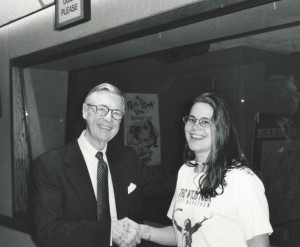
I have met famous people in my time in PR and media. This impresses some people, and I am frequently introduced as “Jenny Lawhorn, she worked with [CELEBRITY]!” One of the reasons I’ve been modestly successful in this regard is because I don’t get too googly-eyed around boldface name. Not usually, anyway. But then, there was Mr. Rogers.
I worked at WNYC in the 90’s and there were writers and actors coming in and out every day to be on the talk shows. Sometimes staff would go up and snap photos with the famous folks while they were penned into the studio with no means of escape. I almost never did this (too cool) but I made an exception for LL Cool J and Fred Rogers.
In all sincerity, Mr. Rogers is someone I greatly admire. I love the work of people who make a big impact with a light step, who can lead and be kind, and who communicate in a way that teaches and inspires without leaving anyone (the less hip, the less educated, the over-educated, the too young, the too old) out.
Among the reasons I admire Mr. Rogers’ communication style:
1 . Good stuff with no fluff. He didn’t practice bragging or puffery, and was not interested in self-aggrandizing.
2. Less is more. Rogers said volumes with great economy. He did not need big words to say big things, even when his audience was other adults.
3. Be true. Mr. Rogers didn’t change himself to suit the times. He knew what he was about. A new cardigan sweater once in awhile was all he needed. Don’t change who you are or what you are doing to sell it. Be who you are.

Every organization needs an irresistibly crisp founding story. I started my company in a van down by the river. I named it after my 3rd grade teacher who liked me in spite of my hyperactivity and anemic looks.
That’s not a great story. It’s not true, either.
I’ve been working on my own since 2005 and recently figured out that what really do is help causes, or organizations and interesting people who have one (or two). I am a curious person, pure and simple, and I do great work for things I find interesting.
The name Silverbee came to me over a period of about a year. I admired fireflies, but they have a short season and are more pretty than useful. Bees are amazing critters. They work hard on teams but have their own sense of direction. They build things. They are, as individuals, essential to the survival of the team. And, as we know, bees are essential for helping grow the food we eat and for maintaining the flora and fauna life depends on.
I am also a member of a few “bees” in my non-work life – a knitting bee or circle populated by a group of geniuses who are artists, scientists, chefs, and friends, and a craft bee of engineers, architects, designers, and a bodybuilder. I would not be me without my bees.
Silver? I like it, and it sounds good with “bee”. OrangeBee just doesn’t have the same ring to it. Silver is also a signal for experience and poignance “That silver-haired daddy of mine) and silver has a quality of reflecting back what is really there. I also read somewhere that putting silver objects on your desk or around your workspace will make you feel more positive.
From there I just went for it, with the help of friends and neighbors and family who gave me a lot of advice and pointers. (Thank you, WendyHeidiJonScottCindyCindyChesterBethJackJeanMark!)
We’re off to the hive.